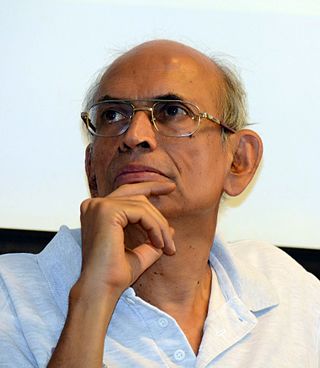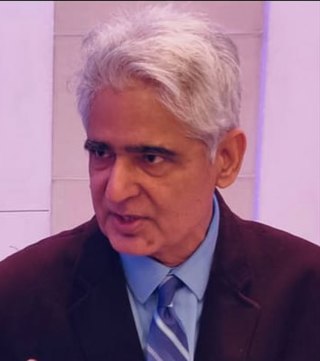K. Paddayya | |
|---|---|
| Born | 20 May 1943 Pamulapadu, Andhra Pradesh, India |
| Occupation | Archaeologist |
| Awards | Padma Shri |
| Website | Official web site |
Katragadda Paddayya is an Indian archaeologist, Professor Emeritus and a former director of Deccan College, known to have introduced two major perspectives in archaeological theory and methodology. [1] He was honored by the Government of India, in 2012, with the fourth highest Indian civilian award of Padma Shri. [2]
Paddayya hails from Pune and secured a doctoral degree in archaeology from Pune University in 1968. [3] He started his career as a lecturer in European Prehistory by joining the department of archaeology of Deccan College. Over the years, he rose in ranks as the Reader, Professor and later, as the Director of the institution. [4] On retirement, Deccan College conferred the status of Professor Emeritus on Paddayya. [3] [4]
Paddayya is known to have done extensive research on the Paleolithic and Neolithic cultures of the Shorapur Doab in the Deccan. [5] [4] He is credited with two theoretical and methodological perspectives in archaeological studies which are considered by many as major innovations. [1] He has held two Fulbright Scholarships with the University of California and University of New Mexico and this has assisted in enhanced cooperation between American and Indian archaeologists. [1] He is also a recipient of Senior lecture grants from University of Michigan, Ann Arbor and the Smithsonian Institution. [1]
Paddayya, who had a close association with the renowned scholar, Kenneth Adrian Raine Kennedy, [6] has authored 7 books [1] and several articles in peer reviewed journals. [7] [8] [9] Some of his notable works are:
Paddayya has served the editorial boards of journals such as Indian Historical Review and the Journal of Social Archaeology [3] and has given many lectures on archaeology. [13] An honorary fellow of the Society of Antiquaries of London, Paddayya was awarded the civilian honour of Padma Shri by the Government of India in 2012. [3] [4]

The Raichur Doab is a Doab, in this case the triangular region of land in the southern Indian states of Telangana and Karnataka lying between the Krishna River and its tributary, the Tungabhadra River. The doab is named for the town of Raichur in the Raichur District. The Raichur Doab is considered to be very fertile because of the sediments carried by Krishna and Tungabhadra rivers. The doab includes Raichur district and Koppal district in Karnataka, and Gadwal district in Telangana. Some areas of Raichur doab also called as Nadigadda region became a part of Telangana during Andhra Pradesh Reorganisation Act in 2014.Those areas are Gadwal, Alampur and Maganoor. Gadwal is one of the 31 districts of Telangana State.

Dilip Kumar Chakrabarti is an Indian archaeologist, Professor Emeritus of South Asian Archaeology at Cambridge University, and a Senior Fellow at the McDonald Institute for Archaeological Research, Cambridge University. He is known for his studies on the early use of iron in India and the archaeology of Eastern India.

D. P. Agrawal is a historian of Indian science and technology, archaeologist, and author. He has published works on Indian archaeology, metallurgy, the history of science, and palaeoclimate.

The South Asian Stone Age spans the prehistoric age from the earliest use of stone tools in the Paleolithic period to the rise of agriculture, domestication, and pottery in the Neolithic period across present-day India, Pakistan, Bangladesh, Nepal, Bhutan, and Sri Lanka. Like in all parts of the world, in South Asia, the divisions of the stone age into the Paleolithic, Mesolithic, and Neolithic periods do not carry precise chronological boundaries; instead, they describe broad phases of technological and cultural development based on the tools and artifacts found at various archaeological sites.

Madhav Dhananjaya Gadgil is an Indian ecologist, academic, writer, columnist and the founder of the Centre for Ecological Sciences, a research forum under the aegis of the Indian Institute of Science. He is a former member of the Scientific Advisory Council to the Prime Minister of India and the Head of the Western Ghats Ecology Expert Panel (WGEEP) of 2010, popularly known as the Gadgil Commission.
Prof Haroon Khan Sherwani (1891–1980) was an Indian historian, scholar, and author. Maulana Azad National Urdu University had created Centre for Deccan Studies in his honor.
Govardhan Rai Sharma (1919–1986) was a Historian from Allahabad University who led the Kausambi excavations which added to original historical research in the country. The ruins of this ancient city were found on the left bank of the river Yamuna, 70 km south-west from Allahabad. Thus commenced excavations of the site by the late Prof. G.R. Sharma of the Allahabad University in 1949 and again in 1951–1956. Following these excavations numerous remains of the ancient city came to light. His findings and claims have been contested by other scholars. He is among the historians who brought archeology in the mainstream of studying History.
Munshiram Manoharlal Publishers Pvt. Ltd. (MRML) is a leading publishing house located in New Delhi, India. Established in 1952 by Manohar Lal Jain, it is one of the oldest publishing houses in India.

Vijay Kumar Saraswat is an Indian scientist who formerly served as the Director General of the Defence Research and Development Organisation (DRDO) and the Chief Scientific Advisor to the Indian Minister of Defence. He retired as the Director General of the DRDO on 31 May 2013. Saraswat is presently a member of NITI Aayog, the Indian Government's apex public policy think tank and the President of Sree Chitra Tirunal Institute for Medical Sciences and Technology, Trivandrum. Saraswat is also a former Chancellor of Jawaharlal Nehru University.
Madhukar Keshav Dhavalikar was an Indian historian and archaeologist.

Ravish Kumar is an Indian journalist, author, media personality and YouTuber. He was the Senior Executive Editor of NDTV India. He hosted a number of programmes including the channel's flagship weekday show Prime Time, Hum Log, Ravish Ki Report, and Des Ki Baat.

Professor Maheswar Neog was an Indian academic who specialised in the cultural history of the North East India especially Assam, besides being an Assamese-language scholar and poet. He was a top Indologist, and his work covers all disciplines of Indian studies, folk-lore, language, dance, history, music, religion, drama, fine arts, paintings, historiography and hagiography, lexicography and orthography, epigraphy and ethnography. His research includes multi-dimensional features of Vaishnava renaissance in Assam through Srimanta Sankardev, Madhabdev, Damodardev, Haridev, Bhattadev and other Vaishnava saints of Assam.
Ravindra Singh Bisht is an Indian archaeologist, known for his scholarship on Indus valley civilization and efforts to conserve Indian national monuments. He was honoured by the Government of India, in 2013, by bestowing on him the Padma Shri, the fourth highest civilian award, for his contributions to the field of archaeology.

Bulusu Lakshmana Deekshatulu is an Indian academic who has made important contributions to Digital Image Processing and Control Theory. He is a Fellow of The World Academy of Sciences, Fellow of Indian National Science Academy, The National Academy of Sciences, India, Indian Academy of Sciences, Indian National Academy of Engineering, National Academy of Agricultural Sciences, and IEEE.

Vijay Sharma is an Indian painter and art historian, known for his expertise in the Pahari school of miniature painting. He was honored by the Government of India, in 2012, with the fourth highest Indian civilian award of Padma Shri.
Sachchidanand Sahai is an Indian epigraphist, writer and the scientific advisor to the Government of Cambodia for restoration of Angkor Wat and the Temple of Preah Vihear, known for his knowledge on Khmer civilization. He was honored by the Government of India, in 2012, with the fourth highest Indian civilian award of Padma Shri.

Mukund Lath was an Indian scholar and cultural historian, known for his writings on music, dance, aesthetics and culture of India. He was honored by the Government of India, in 2010, with the fourth highest Indian civilian award of Padma Shri.

The history of Uttar Pradesh, a state in India, stretches back several millennia. The region shows the presence of human habitation dating back to between 85,000 and 73,000 years ago. Additionally, the region seems to have been domesticated as early as 6,000 BC.

Dipankar Chatterji is an Indian molecular biologist and the Honorary Professor at Molecular Biophysics Unit, Indian Institute of Science, a multidisciplinary research institute under the Department of Science and Technology of the Government of India. He is known for his pioneering research on bacterial transcription. He is a recipient of Shanti Swarup Bhatnagar Prize and is an elected fellow of all the major Indian science academies. The Government of India awarded him the fourth highest civilian honour of the Padma Shri, in 2016, for his contributions to science and engineering.

Karam Tej Singh Sarao is an Indian historian and the former head and professor of Buddhist Studies at the University of Delhi. He has been a visiting professor/fellow at Dongguk University, Chung-Hwa Institute of Buddhist Studies, Preah Sihanouk Raja Buddhist University, St Edmund's College, Cambridge, Maison des Sciences de L'Homme, University of Toronto, and Visva-Bharati University.